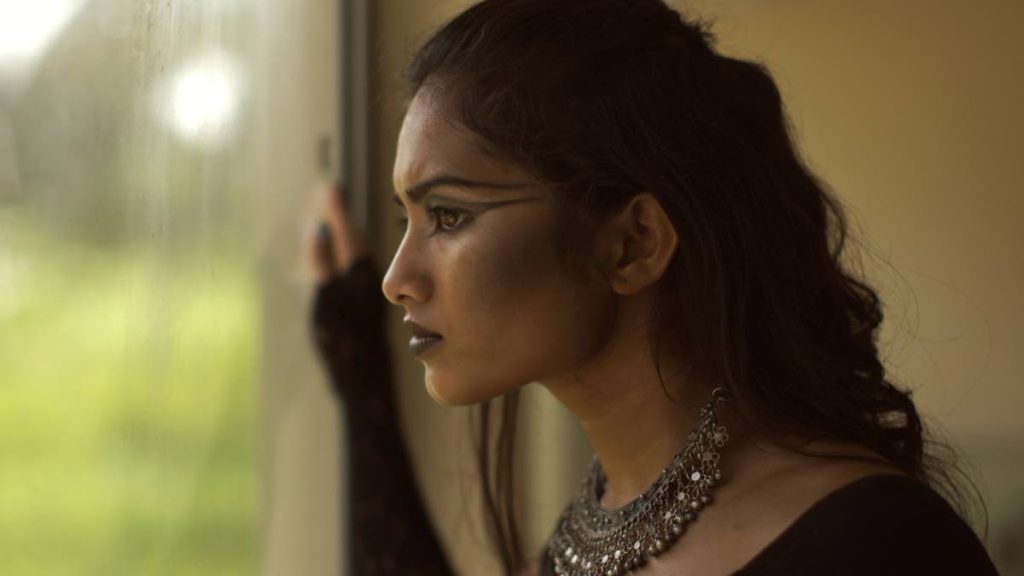Moko Jumbie: An otherworldly romance

Film: Moko Jumbie
Director: Vashti Anderson
Like many Caribbean films, Moko Jumbie opens with the sea, palm trees and bananas.
These visual signifiers are expected, particularly as the film’s Trinidadian-American director Vashti Anderson no doubt hopes that foreign audiences will engage with the film outside of its trinidad+tobago film festival (ttff) run.
But beyond those ubiquitous nautical and agricultural indicators, Moko Jumbie may surprise cinema goers in this part of the world and further afield.
Lead actor Vanna Vee’s appearance, for one, is startling. Her character, Asha, arrives from London lipsticked and eye-shadowed like an 80s-style New Romantic. Some suspension of reality is required to believe that Asha is actually British, despite Vee’s valiant attempt at the accent.
Born to Trini parents, Asha is as unfamiliar with the island as she is with her Indian roots. She doesn’t fit in back home in England either, and the theme is autobiographical. In Anderson’s own mixed-race background growing up in Wisconsin, she felt her difference to the white community around her and her outsider-status on holidays to Trinidad.
Belonging and identity are things we are told humans require, though not all possess.
Staying with her aunt and uncle in far-flung Cedros, Asha senses their detachment from the national identity too. Uncle Jagessar, a captivating performance by Dino Maharaj, speaks of another universe where his grandparents never left India and where he eats chapati every day. Wistful escapism aside, the family is, perhaps unwillingly, rooted in Trinidad and though deep in the bush, they are not sheltered from its troubles.
Though a wearied Jagessar may be losing his marbles and carries about him an unplaceable attachment to the spirit world, he retains a sense of fun. Aunt Mary on the other hand is governed by her distrust of all people – especially the black family living across the street.
Asha becomes fascinated with them, especially Roger (Jeremy Thomas) – a striking young black fisherman. Mary warns her to steer clear and a series of events ratchet up the neighbourly tension.
It is through food, another well-trodden Caribbean filmic meme, that we understand just how British Asha is (she’s never heard of crab and dumpling) and how detached she is from her Trini roots. Food also allows her to flirt with Roger and to bond with his relative Gloria, played by the mercurial Melvina Hazard.
Shark, pepper, chadon beni, fry bake, rice, heat, sweat... It certainly beats fish and chips, sausage and mash, roast beef and gravy. But while food is unquestionably a cornerstone of Caribbean culture, must it be omnipresent in cinema? It’s very hard to watch a film without one’s stomach rumbling, even here in the face of Gloria’s unorthodox culinary methods.
A little calypso dancing and a pan rendition tick more boxes on the checklist of “things that make us, us.”
The eponymous moko jumbie is seen fleetingly and eerily. Things take a surreal turn, politically and spiritually. A powerful, tear-drenched scene on the beach speaks movingly of the Indian experience in Trinidad while Anderson skilfully wreathes scenes in the folkloric haze of African obeah tradition.
While Vee and Thomas make a watchable pair whose passion grows accordingly, it is Hazard as the insouciant, wily mystic and Maharaj as the transcendentalist uncle that elevate the film to a higher level of consciousness.
Moko Jumbie will have its Caribbean premiere on Saturday 23rd at 8.30pm at MovieTowne, Port-of Spain.

Comments
"Moko Jumbie: An otherworldly romance"